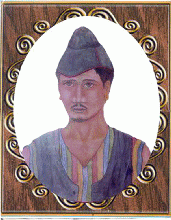Kiang Nongbah
Kiang Nongbah
 Raja Rajendra Singh of Jaintiapur, a Jaintia king was deprived of his kingdom as his territory in the plains was taken away by the British. He was left with the option to rule over his people in the hills which offered little scope for earning revenue for running the administration. Hence he declined kingship. The British then offered rulership to the village headmen, Dolois and Sirdas. This worked well from 1835 to 1853, though the people secretly bore a grudge against the British. Then the British imposed a house-tax in
Raja Rajendra Singh of Jaintiapur, a Jaintia king was deprived of his kingdom as his territory in the plains was taken away by the British. He was left with the option to rule over his people in the hills which offered little scope for earning revenue for running the administration. Hence he declined kingship. The British then offered rulership to the village headmen, Dolois and Sirdas. This worked well from 1835 to 1853, though the people secretly bore a grudge against the British. Then the British imposed a house-tax in
1860 which was met with resentment and within a few months, the people rose in a rebellion that was easily put down as the rebels were not organised. Towards the close of 1860 income tax was also levied in addition to the house-tax. There was an apprehension in the air that tax would also be levied on betel and betel-nut. Imposition of these taxes created turmoil amongst the Jaintias and they rose again in a fierce rebellion in 1862. The magnitude of the upsurge was such that as many as seven regiments and detachments of troops were put into action to suppress it. Jowai, which was besieged by the rebels for about 3 weeks, was thus reoccupied amidst heavy casualties. The leader and guiding spirit in this rebellion was a young man, U Kiang Nongbah. In the first rebellion he kept his identity secret and thus avoided arrest. He was extremely shrewd and a great organiser. He contacted all the Dolois and Sirdars without causing any suspicion. He managed to hoodwink the British Intelligence Service. They had no trace of his movements and activities. Yet, ultimately he was defeated because of the superior might of the British. In the unequal fight that ensured, hundreds of Jaintias were killed and U Kiang Nongbah was betrayed, captured and hung publicly to strike terror into the hearts of the Jaintias on December 30, 1862. When he was put to the gallows, he said, in a clear voice: “If my face turns eastward when I die on the rope, we shall be free again within a hundred years. If it turns westwards, we shall be enslaved forever”. His prophesy came true as India became free within a hundred years!

